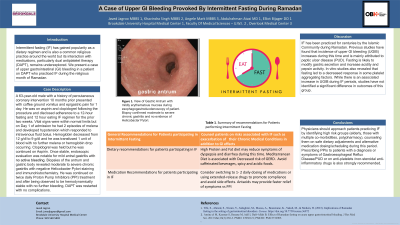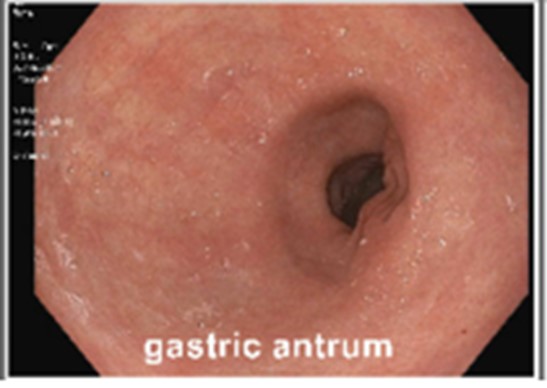Sunday Poster Session
Category: GI Bleeding
P0816 - A Case of Upper GI Bleeding Provoked by Intermittent Fasting During Ramadan
Sunday, October 27, 2024
3:30 PM - 7:00 PM ET
Location: Exhibit Hall E

Has Audio

Javed Jagroo, MBBS
One Brooklyn Health-Brookdale University Hospital Medical Center
Ozone Park, NY
Presenting Author(s)
Javed Jagroo, MBBS1, Khavindra Singh, MBBS2, Angele Mark, MBBS3, Abdulrahman Atasi, MD4, Elliot Bigajer, DO4
1One Brooklyn Health-Brookdale University Hospital Medical Center, Astoria, NY; 2University of the West Indies, San Juan, San Juan-Laventille, Trinidad and Tobago; 3Overlook Medical Center, Summit, NJ; 4One Brooklyn Health-Brookdale University Hospital Medical Center, Brooklyn, NY
Introduction: Intermittent fasting (IF) has gained popularity as a dietary regimen and is also a common religious practice around the world but its interaction with medications, particularly dual antiplatelet therapy (DAPT), remains underexplored. We present a case of upper gastrointestinal (GI) bleeding in a patient on DAPT who practiced IF during the religious month of Ramadan.
Case Description/Methods: A 63-year-old male with a history of percutaneous coronary intervention 10 months prior presented with coffee ground vomitus and epigastric pain for 1 day. He was on aspirin and clopidogrel following the procedure and disclosed adherence to a 12-hour fasting and 12 hour eating IF regimen for the prior two weeks. Vital signs were within normal limits but on Day 1 of admission he had 2 episodes of melena and developed hypotension which responded to intravenous fluid bolus. Hemoglobin decreased from 12 g/dl to 9 g/dl and he was transfused 1 unit of blood with no further melena or hemoglobin drop occurring. Clopidogrel was held but he was continued on Aspirin. Once stable, endoscopic evaluation was notable for mild antral gastritis with no active bleeding. Biopsies of the antrum and gastric body revealed moderate to severe chronic gastritis with negative Helicobacter Pylori staining and immunohistochemistry. He was continued on twice daily Proton Pump Inhibitors (PPI) treatment and after being observed to be hemodynamically stable with no further bleeding, DAPT was restarted with no complications.
Discussion: IF has been practiced for centuries by the Islamic Community during Ramadan. Previous studies have found that incidence of upper GI bleeding (UGIB) increases during this time and is mainly attributed to peptic ulcer disease (PUD). Fasting is likely to modify gastric secretion and increase acidity and pepsin activity. In vitro studies also revealed that fasting led to a decreased response in some platelet aggregating factors. While there is an associated increase in UGIB during IF periods, studies have not identified a significant difference in outcomes of this group. Physicians should approach patients practicing IF by identifying high risk groups (elderly, those with multiple co-morbidities, polypharmacy), counseling them on safe dietary adjustments and alternative medication dosing/scheduling during this period. Prescribing PPIs to patients with a diagnosis or symptoms of Gastroesophageal Reflux Disease/PUD or on anti-platelets /non-steroidal anti-inflammatory drugs is also strongly recommended.

Disclosures:
Javed Jagroo, MBBS1, Khavindra Singh, MBBS2, Angele Mark, MBBS3, Abdulrahman Atasi, MD4, Elliot Bigajer, DO4. P0816 - A Case of Upper GI Bleeding Provoked by Intermittent Fasting During Ramadan, ACG 2024 Annual Scientific Meeting Abstracts. Philadelphia, PA: American College of Gastroenterology.
1One Brooklyn Health-Brookdale University Hospital Medical Center, Astoria, NY; 2University of the West Indies, San Juan, San Juan-Laventille, Trinidad and Tobago; 3Overlook Medical Center, Summit, NJ; 4One Brooklyn Health-Brookdale University Hospital Medical Center, Brooklyn, NY
Introduction: Intermittent fasting (IF) has gained popularity as a dietary regimen and is also a common religious practice around the world but its interaction with medications, particularly dual antiplatelet therapy (DAPT), remains underexplored. We present a case of upper gastrointestinal (GI) bleeding in a patient on DAPT who practiced IF during the religious month of Ramadan.
Case Description/Methods: A 63-year-old male with a history of percutaneous coronary intervention 10 months prior presented with coffee ground vomitus and epigastric pain for 1 day. He was on aspirin and clopidogrel following the procedure and disclosed adherence to a 12-hour fasting and 12 hour eating IF regimen for the prior two weeks. Vital signs were within normal limits but on Day 1 of admission he had 2 episodes of melena and developed hypotension which responded to intravenous fluid bolus. Hemoglobin decreased from 12 g/dl to 9 g/dl and he was transfused 1 unit of blood with no further melena or hemoglobin drop occurring. Clopidogrel was held but he was continued on Aspirin. Once stable, endoscopic evaluation was notable for mild antral gastritis with no active bleeding. Biopsies of the antrum and gastric body revealed moderate to severe chronic gastritis with negative Helicobacter Pylori staining and immunohistochemistry. He was continued on twice daily Proton Pump Inhibitors (PPI) treatment and after being observed to be hemodynamically stable with no further bleeding, DAPT was restarted with no complications.
Discussion: IF has been practiced for centuries by the Islamic Community during Ramadan. Previous studies have found that incidence of upper GI bleeding (UGIB) increases during this time and is mainly attributed to peptic ulcer disease (PUD). Fasting is likely to modify gastric secretion and increase acidity and pepsin activity. In vitro studies also revealed that fasting led to a decreased response in some platelet aggregating factors. While there is an associated increase in UGIB during IF periods, studies have not identified a significant difference in outcomes of this group. Physicians should approach patients practicing IF by identifying high risk groups (elderly, those with multiple co-morbidities, polypharmacy), counseling them on safe dietary adjustments and alternative medication dosing/scheduling during this period. Prescribing PPIs to patients with a diagnosis or symptoms of Gastroesophageal Reflux Disease/PUD or on anti-platelets /non-steroidal anti-inflammatory drugs is also strongly recommended.

Figure: View of Gastric Antrum with mildly erythematous mucosa during esophagogastroduodenoscopy of patient. Biopsy confirmed moderate to severe chronic gastritis and no evidence of Helicobacter Pylori.
Disclosures:
Javed Jagroo indicated no relevant financial relationships.
Khavindra Singh indicated no relevant financial relationships.
Angele Mark indicated no relevant financial relationships.
Abdulrahman Atasi indicated no relevant financial relationships.
Elliot Bigajer indicated no relevant financial relationships.
Javed Jagroo, MBBS1, Khavindra Singh, MBBS2, Angele Mark, MBBS3, Abdulrahman Atasi, MD4, Elliot Bigajer, DO4. P0816 - A Case of Upper GI Bleeding Provoked by Intermittent Fasting During Ramadan, ACG 2024 Annual Scientific Meeting Abstracts. Philadelphia, PA: American College of Gastroenterology.
